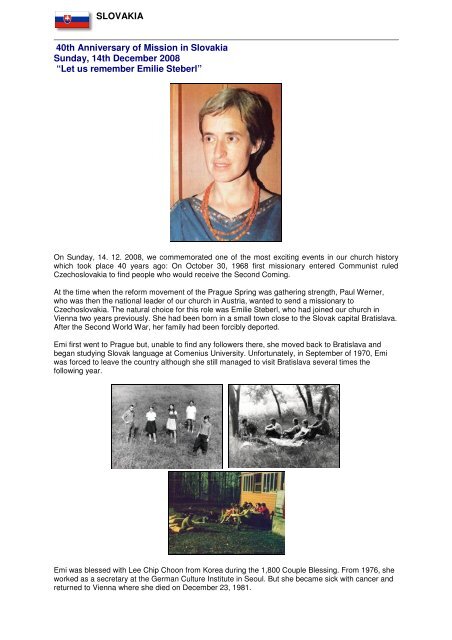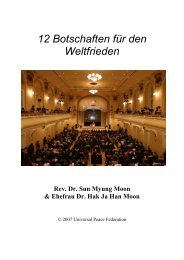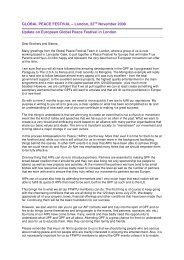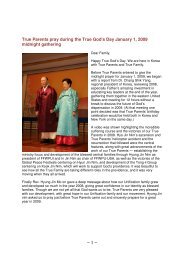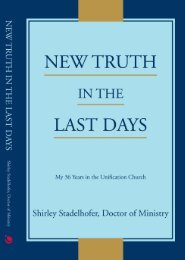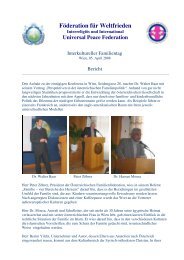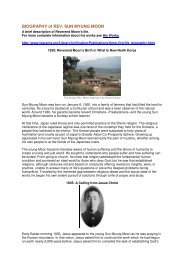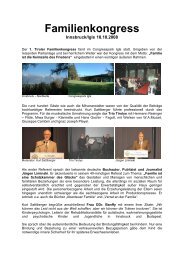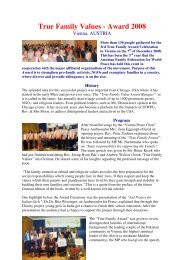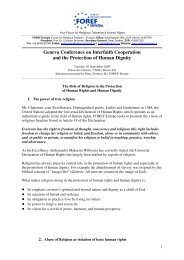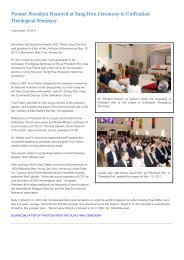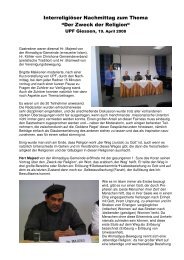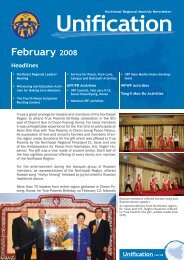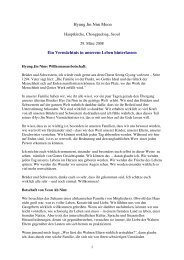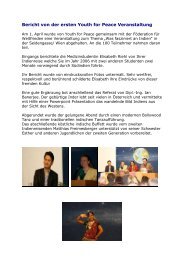Emmi Steberl-Lee,23 December, 1981
Emmi Steberl-Lee,23 December, 1981
Emmi Steberl-Lee,23 December, 1981
You also want an ePaper? Increase the reach of your titles
YUMPU automatically turns print PDFs into web optimized ePapers that Google loves.
SLOVAKIA<br />
40th Anniversary of Mission in Slovakia<br />
Sunday, 14th <strong>December</strong> 2008<br />
“Let us remember Emilie <strong>Steberl</strong>”<br />
On Sunday, 14. 12. 2008, we commemorated one of the most exciting events in our church history<br />
which took place 40 years ago: On October 30, 1968 first missionary entered Communist ruled<br />
Czechoslovakia to find people who would receive the Second Coming.<br />
At the time when the reform movement of the Prague Spring was gathering strength, Paul Werner,<br />
who was then the national leader of our church in Austria, wanted to send a missionary to<br />
Czechoslovakia. The natural choice for this role was Emilie <strong>Steberl</strong>, who had joined our church in<br />
Vienna two years previously. She had been born in a small town close to the Slovak capital Bratislava.<br />
After the Second World War, her family had been forcibly deported.<br />
Emi first went to Prague but, unable to find any followers there, she moved back to Bratislava and<br />
began studying Slovak language at Comenius University. Unfortunately, in September of 1970, Emi<br />
was forced to leave the country although she still managed to visit Bratislava several times the<br />
following year.<br />
Emi was blessed with <strong>Lee</strong> Chip Choon from Korea during the 1,800 Couple Blessing. From 1976, she<br />
worked as a secretary at the German Culture Institute in Seoul. But she became sick with cancer and<br />
returned to Vienna where she died on <strong>December</strong> <strong>23</strong>, <strong>1981</strong>.
Since there was no Seung-Hwa Ceremony at that time, the Slovak church decided to visit her grave<br />
and make a similar ceremony now. More than 30 members drove with a bus from Bratislava to Vienna.<br />
During the travel we read something about her life from the photo album which was made by her<br />
husband after her death. As an active member of the VOC movement, Mr. <strong>Lee</strong> was very inspired by<br />
the strong anti-Communist attitude of his wife and her love for Korea. Emi had a frail health but an iron<br />
will, he wrote. With the good salary she received from the work at the German Embassy, she bought<br />
food and medicine and distributed it among the needy in Seoul.<br />
At her grave which carries the number <strong>23</strong>4, we met Mrs. Gertrud Koch, Mrs. Maria Riehl who was born<br />
in Slovakia but joined our church in Austria in the 1960ies, and the former missionaries Christian<br />
Zwerger (Bulgaria) and Martin Putz (Hungary). The sky was clouded and a cold wind blowing.<br />
Members offered flowers and incense sticks, sang Holy Songs as well as the Korean national anthem<br />
and a patriotic Slovak song. NL Igor Koromhaz and some of the first members including Emi’s spiritual<br />
daughter Dorota Simekova said prayers. Holy Salt was sprinkled on the grave. Our loud cheers of<br />
Mansei surprised the few visitors on the cemetery.
Walking back to the bus, Christian Zwerger told us a fascinating story: In 1974, when he was<br />
witnessing in the shopping area Kaernterstrasse in Vienna, he met a young man from Slovakia who<br />
followed him into the church centre “Schluesselgasse”. When Christian introduced to him the Divine<br />
Principle, the guest started to quote the Divine Principle and told him, that our members there right<br />
now are under big pressure, even imprisoned. Christian Zwerger was astonished because he had no<br />
idea that there were any UC members in any Communist country! The guest sang with him “Urie” and<br />
said that he won’t be able to return because it would draw suspicion. He had to return with the bus tour<br />
to CSSR. The identity of that person has not been clarified until today.<br />
The second part of the celebration took place in the national HQ which is located in a village close to<br />
Bratislava. Here joined us people who were not able to travel to Vienna.<br />
First, a framed picture of Emilie <strong>Steberl</strong> was presented. It will decorate the wall of the large seminar<br />
room.<br />
Dorota Simekova recited a wonderful poem she had written herself. Milos Klas made a PowerPoint<br />
presentation with photographs of Emi and the early church members. Igor Koromhaz presented the<br />
old typing machine which served to type the first Divine Principle book in the native language. Emi had<br />
given it to a brother who was a native of the Slovak town of Presov. He emigrated during the<br />
Communist area and lives in Germany. Gabriel Körtvelyessy wanted to get rid of the typing machine<br />
long time ago because it was a burden to him, and he did not know about its great significance and<br />
value. Not long time ago he came to Bratislava and handed the machine over. Erika Lajdova enriched
the collection with the first book of Divine Principle in Slovak language, the first small song book used<br />
by members and her handwritten chapters of Divine Principle.<br />
Another highlight of the day was the speech of Brunhilde d’Alberti, who lives in the Czech Republic.<br />
Hardly anybody in the audience knew the many fascinating details of her mission. In 1971, Brunhilde<br />
was a member in Germany with just two years experience of church life, at first she was overwhelmed<br />
but courageously followed the foot steps of Emi. After some visits the secret police was on her heels,<br />
during her tenth and last stay Brunhilde hardly managed to escape out of the country. Some artistic<br />
talented brother, who was imprisoned, had painted her picture which was put up by the police at the<br />
borders: WANTED!<br />
Mrs. Brunhilde d’Alberti later became national messiah of the Czech Republic, while Mrs. Gertrud<br />
Koch became national messiah of Slovakia. Both from Germany, they serve the former twin-nation of<br />
the Czech and Slovak Republic even 20 years after the fall of the Iron Curtain.<br />
Some months ago Juraj Lajda had investigated at the Nation’s Memory Institute in Bratislava. In the<br />
archives he found documents that the secret police already was well informed about the activities of<br />
Emi <strong>Steberl</strong>. But the Communists waited some years until they arrested our members; about 30<br />
received prison terms up to 5 years.<br />
At the finale, some of the early members recounted their experiences, especially about the fine<br />
character of Emi, who will be something like a patron of our nation.<br />
By Barbara Grabner


